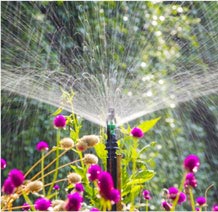FAQ Regarding Sprinklers and Irrigation Systems
Sprinkler and irrigation systems are operating at full capacity now that summer has arrived. But issues can come up, and you might not have the answers. Read on for some of the most frequently asked questions concerning these watering systems before making a call to a contractor.
How long do I need to water my garden and lawn?
This is dependent on the sprinkler system you have and the rate of rainfall. In a normal spray run, shrubs will be watered for ten minutes, followed by half an hour of circle rotors and an hour of full circle rotors. To set up your program, get in touch with a nearby sprinkler installer.
What components make up a sprinkler system?
The sprinkler heads (rotary or spray) are strategically set in a geometric design to effectively water your lawn. It is divided into zones to maximize water pressure and because different parts of your lawn require different amounts of watering. The system's controller, or timer, which specifies when it should work, is the last component.
My sprinklers will not stop.
Consider pulling the controller's plug. If this works, reprogram the controller in accordance with the manufacturer's instructions. If the system does not shut off, turn off the sprinkler water and get in touch with the sprinkler system provider.
Sprinklers: do they save water?
Yes. Water conservation is one of the main benefits of using an autonomous watering system. A system that has been implemented and kept up to date will provide complete hydration coverage as well as accurate water distribution, timing, and calibration. The optimum time to water your plants is in the morning, since the earth has had plenty of time to absorb the water, the wind is calmer, and the water pressure is at its highest.
Are rain sensors a wise purchase?
One of the best methods to conserve water and increase the lifespan of your system is to use rain sensors. Consider adding one to your irrigation system since they enable your sprinklers to take a rest when it rains.
Why won't my rotating sprinkler turn?
The filter may be clogged, so try cleaning it out if the sprinkler has stopped rotating or the water flow has dropped. If this doesn't fix the problem, it's likely that the internal assembly needs to be changed.
How do irrigation zones work? Are they important?
Prior to the installation of the system, irrigation zones are planned. The amount of water required for adequate hydration is used to divide each zone. Zones in sunny places, for instance, might need more, while zones in gloomy areas generally need less. Water efficiency is determined by these zones, which results in reduced waste.

Comments
Post a Comment